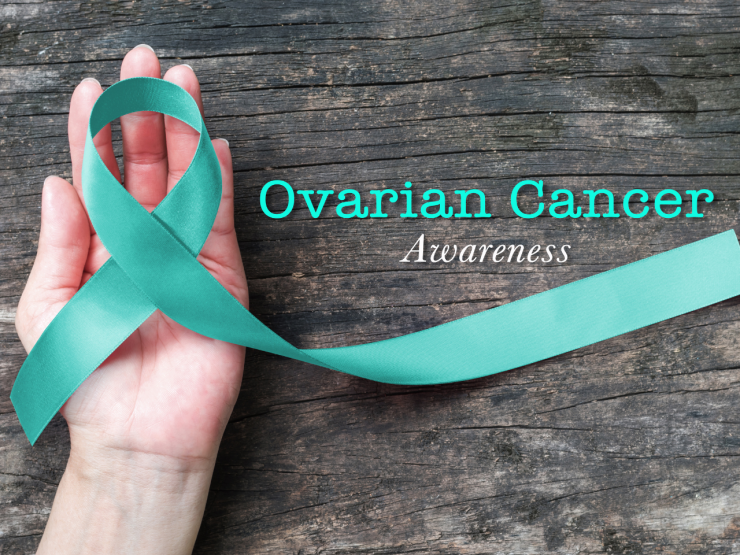March 2023 Ovarian Cancer Blog
Around 7,500 women are diagnosed as having ovarian cancer every year in the UK, 21 a day.
In the UK, sadly it claims the lives of around 4,100 women every year, 11 every day.
March is Ovarian Cancer awareness month, we want to contribute to raising awareness so that we can help save the lives of Mothers, grandmothers, sisters, aunties, partners, friends, colleagues, and well every woman! So, they can continue to live a fulfilling and meaningful life and be there for the ones they love.
What is Cancer and Ovarian Cancer?
The human body consists of trillions of cells. These cells refresh and replace the obsolete worn-out ones to keep us healthy.
This method means that when an expired cell is destroyed a new one will replace it with a healthy cell splitting into two. This event is controlled so that the number of cells created is reflective of the number destroyed.
However, sometimes something can cause this process to be interrupted and the signals that are responsible for telling the cell to stop dividing are not delivered. This causes the cell to continuously divide itself, in turn creating a lump also known as a tumour. The tumour will grow uncontrollably in mass and begin to encroach on healthy surrounding tissues and organs, this is what is referred to as cancer.
The Ovaries are made up of two small organs, they are positioned in the pelvis in the lower abdomen to the left and right side of the uterus. They are part of the reproductive/hormonal system, playing a vital role in menstruation and conception. Producing eggs to be fertilized and creating the hormones progesterone and estrogen.
Ovarian cancer is a form of cancer that affects the ovaries and has several different forms. Despite all coming under the umbrella term of ovarian cancer they all have their specific origins, treatment and prognosis.
The cancer begins in the cells in and surrounding the ovaries and fallopian tubes.
The cancer cells often spread through the lining of the stomach (peritoneum) and create lumps located on the surface of the bowels (omentum) and liver. In rare cases, it can also cause lumps to form inside the liver, lungs and spleen. These lumps are referred to as metastases (secondary cancer) which are formed in other areas of the body resultant of the spread of the ovarian cancer cells. They create excess fluid known as ascites which causes fluid to collect within spaces in the abdomen, causing uncomfortable symptoms and bloating.
It is important to understand the histological type (which cancer), the stage it has progressed to (if/how it has spread) and the grade (how the cancerous cells appear in comparison to regular cells) to help you when talking about the diagnosis and treatment/prognosis with your doctor/specialist.
Who can Ovarian Cancer affect?
1in 52 women will be diagnosed as having ovarian cancer within their lifetime.
Ovarian cancer can be developed by anyone who has ovaries, women, intersex individuals born with ovaries, trans men and people of non-binary status.
In the UK ovarian cancer is the sixth most common form of cancer-related death and accounts for 4% of all new cases of cancer in women.
It is more common in women over 50 and the risk increases with age. Most ovarian cancers will develop post-menopause. However, despite the disease being rare in those under 40 and even more so In those between 15 and 19 it can and does affect younger women too.
The symptoms of Ovarian Cancer
Did you know 90% of women don’t know the main symptoms?
Diagnosis before cancer can spread increases the chances of successful treatment. Therefore, you should be mindful and aware of any unexplained new changes within the body.
Symptoms will be frequent and occur dozens of times within a month, they do not ease and are persistent. The symptoms will be new and unusual to you.
Symptoms include but are not limited to:
Main
· Bloating (persistent bloating that doesn’t ease)
· A loss of appetite and feeling full
· Pain located in the pelvis and abdomen
· Needing to urinate
Other
· Irregular bowel movements
· Unexpected weight loss
· Vaginal bleeding post menopause
· Feeling fatigued
· Back pain
If you are experiencing any of the listed symptoms regularly and are worried about your health, you should book an appointment to get reviewed and discuss your concerns with a GP.
Screening, Diagnosis & Treatment
1 in 4 women incorrectly believes a cervical smear test can detect ovarian cancer.
Sadly, there aren’t any early detection tests or national screening programs specifically for Ovarian Cancer right now, making it critical to be mindful of changes within your body.
The right course of treatment will be determined by the type, stage and grade of cancer as well as general health.
A dedicated specialist care team will discuss treatment options as well as the benefits and side effects associated and assist you to create and develop a tailored treatment plan.
You will be required to attend regular appointments throughout the course and post-treatment and you may also be required to have additional tests and scans.
The most effective and main treatments used for ovarian cancer are surgery and chemotherapy. However, there are other options such as radiotherapy, hormone treatments and targeted medicines.
Surgery
Which type of operation is needed will depend on the type of cancer and how it has spread. Cancer which has been found early has been more treatable.
It may mean both ovaries and fallopian tubes need to be removed (bilateral salpingo-oophorectomy)
or the removal of the opening to the womb from the cervix and the womb itself. (abdominal hysterectomy).
If cancer has managed to spread to additional parts of the body more surgery may be required to remove as much of the cancer as possible.
Chemotherapy
Chemotherapy can be administered before and after surgery or used alone to treat cancer, utilising one or more anti-cancer drugs.
A course of chemotherapy tends to last between 3 and 6 months. It can be administered intravenously (into a vein) or in tablet/capsule form.
This method of treatment may be used with a curative intent or to reduce symptoms and prolong life.
How to lower your risk of developing ovarian cancer
Despite there being no known way to completely prevent or stop ovarian cancer from developing, you can make reduce your chances of developing it with certain medical choices such as:
· Taking contraceptive pills for over 5 years
· Breastfeeding for a year or more
· Multiple pregnancies or having your first full-term pregnancy before you reach 26 years old
· Hysterectomy or tubal ligation
Survival rate
Survival is determined by the stage your cancer has reached upon diagnosis, its type and its grade.
Outsides factors such as your health and fitness also contribute and this can be graded using the performance status system.
Age also plays a part with survival rates being better in younger women.
· 70% of women diagnosed will survive their cancer for 1 year or more
· 45% will survive for five years or more
· 35% will survive for ten years or more
We all need to be mindful when it comes to the symptoms of ovarian cancer, it might just save your life or the life of someone you love.
Fortunately, since the 1970s mortality rates related to ovarian cancers have decreased by almost a quarter, but by raising awareness we can all contribute towards reducing that figure even more.
United we can and will beat cancer.
If you know someone struggling with or worried about ovarian cancer, please visit a GP for support and guidance.
To find out how you can get involved visit https://targetovariancancer.org.uk/
Data sourced form*
https://www.therobincancertrust.org/



